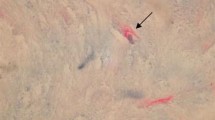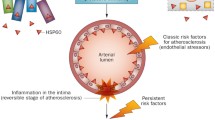Abstract
We identified increased expression and redistribution of the intracellular protein 60-kDa human heat shock protein (hHSP60) (HSPD1) to the cell surface in human endothelial cells subjected to classical atherosclerosis risk factors and subsequent immunologic cross-reactivity against this highly conserved molecule, as key events occurring early in the process of atherosclerosis. The present study aimed at investigating the role of infectious pathogens as stress factors for vascular endothelial cells and, as such, contributors to early atherosclerotic lesion formation. Using primary donor-matched arterial and venous human endothelial cells, we show that infection with Chlamydia pneumoniae leads to marked upregulation and surface expression of hHSP60 and adhesion molecules. Moreover, we provide evidence for an increased susceptibility of arterial endothelial cells for redistribution of hHSP60 to the cellular membrane in response to C. pneumoniae infection as compared to autologous venous endothelial cells. We also show that oxidative stress has a central role to play in endothelial cell activation in response to chlamydial infection. These data provide evidence for a role of C. pneumoniae as a potent primary endothelial stressor for arterial endothelial cells leading to enrichment of hHSP60 on the cellular membrane and, as such, a potential initiator of atherosclerosis.






Similar content being viewed by others
References
Amberger A, Maczek C, Jürgens G, Michaelis D, Schett G, Trieb K, Eberl T, Jindal S, Xu Q, Wick G (1997) Co-expression of ICAM-1, VCAM-1, ELAM-1 and Hsp60 in human arterial and venous endothelial cells in response to cytokines and oxidized low-density lipoproteins. Cell Stress Chaperones 2:94–103
Benagiano M, D'Elios MM, Amedei A, Azzurri A, van der Zee R, Ciervo A, Rombolà G, Romagnani S, Cassone A, Prete D (2005) Human 60-kDa heat shock protein is a target autoantigen of T cells derived from atherosclerotic plaques. J Immunol 174:6509–6517
Bernhard D, Csordas A, Henderson B, Rossmann A, Kind M, Wick G (2005) Cigarette smoke metal-catalyzed protein oxidation leads to vascular endothelial cell contraction by depolymerization of microtubules. FASEB J 19:1096–1107
Chen C, Chai H, Wang X, Lin PH, Yao Q (2009) Chlamydia heat shock protein 60 decreases expression of endothelial nitric oxide synthase in human and porcine coronary artery endothelial cells. Cardiovasc Res 83:768–777
Curry AJ, Portig I, Goodall JC, Kirkpatrick PJ, Gaston JS (2000) T lymphocyte lines isolated from atheromatous plaque contain cells capable of responding to Chlamydia antigens. Clin Exp Immunol 121:261–269
Dechend R, Gieffers J, Dietz R, Joerres A, Rupp J, Luft FC, Maas M (2003) Hydroxymethylglutaryl coenzyme A reductase inhibition reduces Chlamydia pneumoniae-induced cell interaction and activation. Circulation 108:261–265
George J, Shoenfeld Y, Afek A, Gilburd B, Keren P, Shaish A, Kopolovic J, Wick G, Harats D (1999) Enhanced fatty streak formation in C57BL/6J mice by immunization with heat shock protein-65. Arterioscler Thromb Vasc Biol 19:505–510
Gieffers J, Füllgraf H, Jahn J, Klinger M, Dalhoff K, Katus HA, Solbach W, Maas M (2001) Chlamydia pneumoniae infection in circulating human monocytes is refractory to antibiotic treatment. Circulation 103:351–356
Grayston JT (2000) Background and current knowledge of Chlamydia pneumoniae and atherosclerosis. J Infect Dis 181(Suppl 3):S402–S410
Grundtman C, Kreutmayer SB, Almanzar G, Wick MC, Wick G (2011) Heat shock protein 60 and immune inflammatory responses in atherosclerosis. Arterioscler Thromb Vasc Biol 31:960–968
Grundtman C, Wick G (2011) The autoimmune concept of atherosclerosis. Curr Opin Lipidol 22:327–334
Hansson GK (2001) Immune mechanisms in atherosclerosis. Arterioscler Thromb Vasc Biol 21:1876–1890
Henderson B, Csordas A, Backovic A, Kind M, Bernhard D, Wick G (2008) Cigarette smoke is an endothelial stressor and leads to cell cycle arrest. Atherosclerosis 201:298–305
Hogdahl M, Soderlund G, Kihlstrom E (2008) Expression of chemokines and adhesion molecules in human coronary artery endothelial cells infected with Chlamydia (Chlamydophila) pneumoniae. APMIS 116:1082–1088
Hoshida S, Nishino M, Tanouchi J, Kishimoto T, Yamada Y (2005) Acute Chlamydia pneumoniae infection with heat-shock-protein-60-related response in patients with acute coronary syndrome. Atherosclerosis 183:109–112
Jackson LA, Campbell LA, Kuo CC, Rodriguez DI, Lee A, Grayston JT (1997) Isolation of Chlamydia pneumoniae from a carotid endarterectomy specimen. J Infect Dis 176:292–295
Knoflach M, Kiechl S, Mayrl B, Kind M, Gaston JS, van der Zee R, Faggionato A, Mayr A, Willeit J, Wick G (2007) T-cell reactivity against HSP60 relates to early but not advanced atherosclerosis. Atherosclerosis 195:333–338
Knoflach M, Kiechl S, Penz D, Zangerle A, Schmidauer C, Rossmann A, Shingh M, Spallek R, Griesmacher A, Bernhard D, Robacher P, Buchberger W, Draxl W, Willeit J, Wick G (2009) Cardiovascular risk factors and atherosclerosis in young women: atherosclerosis risk factors in female youngsters (ARFY study). Stroke 40:1063–1069
Kothe H, Dalhoff K, Rupp J, Müller A, Kreuzer J, Maass M, Katus HA (2000) Hydroxymethylglutaryl coenzyme A reductase inhibitors modify the inflammatory response of human macrophages and endothelial cells infected with Chlamydia pneumoniae. Circulation 101:1760–1763
Kreutmayer SB, Messner B, Knoflach M, Henderson B, Niederegger H, Böck G, Van der Zee R, Wick G, Bernhard D (2011) Dynamics of heat shock protein 60 in endothelial cells exposed to cigarette smoke extract. J Mol Cell Cardiol 51:777–780
Krüll M, Klucken AC, Wuppermann FN, Fuhrmann O, Magerl C, Seybold J, Hippenstiel S, Hagemann JH, Jantos CA, Suttorp N (1999) Signal transduction pathways activated in endothelial cells following infection with Chlamydia pneumoniae. J Immunol 162:4834–4841
Lassègue B, Griendling KK (2010) NADPH oxidases: functions and pathologies in the vasculature. Arterioscler Thromb Vasc Biol 30:653–661
Lewinska A, Wnuk M, Slota E, Bartosz G (2007) Total anti-oxidant capacity of cell culture media. Clin Exp Pharmacol Physiol 34:781–786
Libby P (2002) Inflammation in atherosclerosis. Nature 420:868–874
Mayr M, Metzler B, Kiechl S, Willeit J, Schett G, Xu Q, Wick G (1999a) Endothelial cytotoxicity mediated by serum antibodies to heat shock proteins of Escherichia coli and Chlamydia pneumoniae: immune reactions to heat shock proteins as a possible link between infection and atherosclerosis. Circulation 99:1560–1566
Mayr M, Xu Q, Wick G (1999b) Atherogenic effects of chronic infections: the role of heat shock protein 60 in autoimmunity. Isr Med Assoc J 1:272–277
Molestina RE, Miller RD, Ramirez JA, Summersgill JT (1999) Infection of human endothelial cells with Chlamydia pneumoniae stimulates transendothelial migration of neutrophils and monocytes. Infect Immun 67:1323–1330
Peters J, Hess S, Endlich K, Thalmann J, Holzberg D, Kracht M, Schaefer M, Bartling G, Klos A (2005) Silencing or permanent activation: host-cell responses in models of persistent Chlamydia pneumoniae infection. Cell Microbiol 7:1099–1108
Ross R (1999) Atherosclerosis—an inflammatory disease. N Engl J Med 340:115–126
Rossmann A, Henderson B, Heidecker B, Seiler R, Fraedrich G, Singh M, Parson W, Keller M, Grubeck-Loebenstein B, Wick G (2008) T-cells from advanced atherosclerotic lesions recognize hHSP60 and have a restricted T-cell receptor repertoire. Exp Gerontol 43:229–237
Rupp J, Berger M, Reiling N, Gieffers J, Lindschau C, Haller H, Dalhoff K, Maass M (2004) Cox-2 inhibition abrogates Chlamydia pneumoniae-induced PGE2 and MMP-1 expression. Biochem Biophys Res Commun 320:738–744
Saikku P, Leinonen M, Mattila K, Ekman MR, Nieminen MS, Mäkelä PH, Huttunen JK, Valtonen V (1988) Serological evidence of an association of a novel Chlamydia, TWAR, with chronic coronary heart disease and acute myocardial infarction. Lancet 2:983–986
Shi Y, Tokunaga O (2004) Chlamydia pneumoniae (C. pneumoniae) infection upregulates atherosclerosis-related gene expression in human umbilical vein endothelial cells (HUVECs). Atherosclerosis 177:245–253
Singh B, Gupta RS (1992) Expression of human 60-kD heat shockprotein (HSP60 or P1) in Escherichia coli and the development and characterization of corresponding monoclonal antibodies. DNA Cell Biol 11:489–496
Wick G, Knoflach M, Xu Q (2004) Autoimmune and inflammatory mechanisms in atherosclerosis. Annu Rev Immunol 22:361–403
Wick G, Perschinka H, Millonig G (2001) Atherosclerosis as an autoimmune disease: an update. Trends Immunol 22:665–669
Wick G (2000) Atherosclerosis—an autoimmune disease due to an immune reaction against heat-shock protein 60. Herz 25:87–90
Wick MC, Mayerl C, Backovic A, van der Zee R, Jaschke W, Dietrich H, Wick G (2008) In vivo imaging of the effect of LPS on arterial endothelial cells: molecular imaging of heat shock protein 60 expression. Cell Stress Chaperones 13:275–285
Xu Q, Dietrich H, Steiner HJ, Gown AM, Schoel B, Mikuz G, Kaufmann SH, Wick G (1992) Induction of arteriosclerosis in normocholesterolemic rabbits by immunization with heat shock protein 65. Arterioscler Thromb Vasc Biol 12:789–799
Xu Q, Kiechl S, Mayr M, Metzler B, Egger G, Oberhollenzer F, Willeit J, Wick G (1999) Association of serum antibodies to heat-shock protein 65 with carotid atherosclerosis: clinical significance determined in a follow-up study. Circulation 100:1169–1174
Xu Q, Luef G, Weimann S, Gupta RS, Wolf H, Wick G (1993a) Staining of endothelial cells and macrophages in atherosclerotic lesions with human heat-shock protein-reactive antisera. Arterioscler Thromb Vasc Biol 13:1763–1769
Xu Q, Schett G, Perschinka H, Mayr M, Egger G, Oberhollenzer F, Willeit J, Kiechl S, Wick G (2000) Serum soluble heat shock protein 60 is elevated in subjects with atherosclerosis in a general population. Circulation 102:14–20
Xu Q, Schett G, Seitz CS, Hu Y, Gupta RS, Wick G (1994) Surface staining and cytotoxic activity of heat-shock protein 60 antibody in stressed aortic endothelial cells. Circ Res 75:1078–1085
Xu Q, Willeit J, Marosi M, Kleindienst R, Oberhollenzer F, Kiechl S, Stulnig T, Luef G, Wick G (1993b) Association of serum antibodies to heat-shock protein 65 with carotid atherosclerosis. Lancet 341:255–259
Yamashita K, Ouchi K, Shirai M, Gondo T, Nakazawa T, Ito H (1998) Distribution of Chlamydia pneumoniae infection in the athersclerotic carotid artery. Stroke 29:773–778
Young RA, Elliott TJ (1989) Stress proteins, infection, and immune surveillance. Cell 59:5–8
Zhang ZH, Yu Y, Wei SG, Felder RB (2010) Centrally administered lipopolysaccharide elicits sympathetic excitation via NAD(P)H oxidase-dependent mitogen-activated protein kinase signaling. J Hypertens 28:806–816
Acknowledgments
We thank Rajam Csordas-Iyer for critical reading and editorial assistance. This work was supported by the European Initiative to Fight Chlamydial Infections by Unbiased Genomics (ECIBUG; # 818496 to GW), the Austrian Research Fund (FWF grant # 14741 to GW), and the TOLERAGE Health Research Grant (HEALTH-F4-2008-202156 to GW).
Author information
Authors and Affiliations
Corresponding author
Additional information
Simone Kreutmayer and Adam Csordas contributed equally to this work.
Rights and permissions
About this article
Cite this article
Kreutmayer, S., Csordas, A., Kern, J. et al. Chlamydia pneumoniae infection acts as an endothelial stressor with the potential to initiate the earliest heat shock protein 60-dependent inflammatory stage of atherosclerosis. Cell Stress and Chaperones 18, 259–268 (2013). https://doi.org/10.1007/s12192-012-0378-7
Received:
Revised:
Accepted:
Published:
Issue Date:
DOI: https://doi.org/10.1007/s12192-012-0378-7




